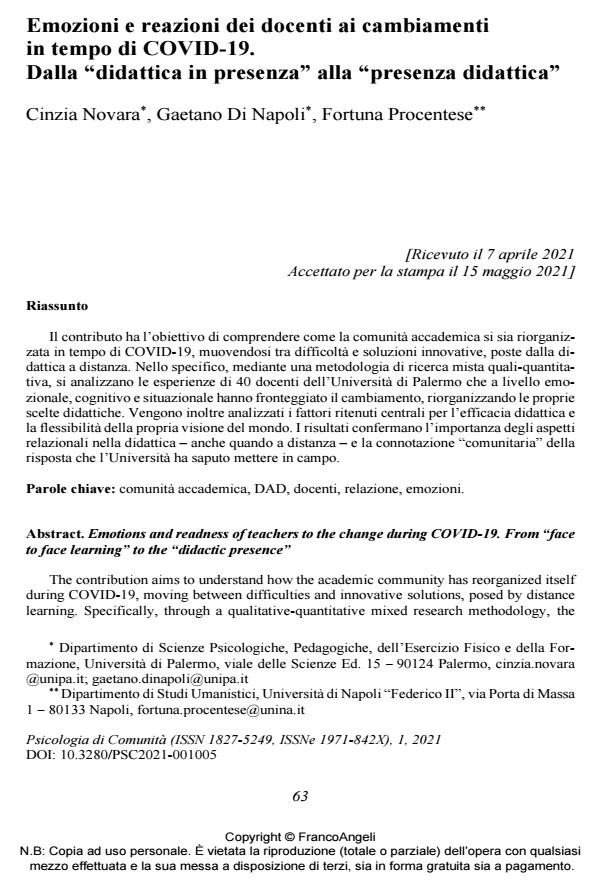Emotions and readness of teachers to the change during COVID-19. From "face to face learning" to the "didactic presence"
Journal title PSICOLOGIA DI COMUNITA’
Author/s Cinzia Novara, Gaetano Di Napoli, Fortuna Procentese
Publishing Year 2021 Issue 2021/1
Language Italian Pages 18 P. 63-80 File size 356 KB
DOI 10.3280/PSC2021-001005
DOI is like a bar code for intellectual property: to have more infomation
click here
Below, you can see the article first page
If you want to buy this article in PDF format, you can do it, following the instructions to buy download credits

FrancoAngeli is member of Publishers International Linking Association, Inc (PILA), a not-for-profit association which run the CrossRef service enabling links to and from online scholarly content.
The contribution aims to understand how the academic community has reorganized itself during COVID-19, moving between difficulties and innovative solutions, posed by distance learning. Specifically, through a qualitative-quantitative mixed research methodology, the ex-periences of 40 professors of the University of Palermo are analyzed, which on an emotional, cognitive and situational level have faced the change, consequently directing their educational choices. The factors considered central to the didactic effectiveness and flexibility of one’s worldview are also analyzed. The results confirm the importance of relational aspects in teach-ing - even when at a distance - and the "community" connotation of the response that the University has been able to put in place.
Keywords: academic community, distance learning, teachers, relationship, emotions.
- Teachers’ stress experiences during COVID-19-related emergency remote teaching: Results from an exploratory study Ilaria Vergine, Flora Gatti, Giulia Berta, Giulia Marcucci, Alice Seccamani, Carlo Galimberti, in Frontiers in Education 1009974/2022
DOI: 10.3389/feduc.2022.1009974 - Protective and risk social dimensions of emergency remote teaching during COVID‐19 pandemic: A multiple mediation study Fortuna Procentese, Flora Gatti, Emiliano Ceglie, in Journal of Community Psychology /2023 pp.67
DOI: 10.1002/jcop.22879
Cinzia Novara, Gaetano Di Napoli, Fortuna Procentese, Emozioni e reazioni dei docenti ai cambiamenti in tempo di COVID-19. Dalla "didattica in presenza" alla "presenza didattica" in "PSICOLOGIA DI COMUNITA’" 1/2021, pp 63-80, DOI: 10.3280/PSC2021-001005